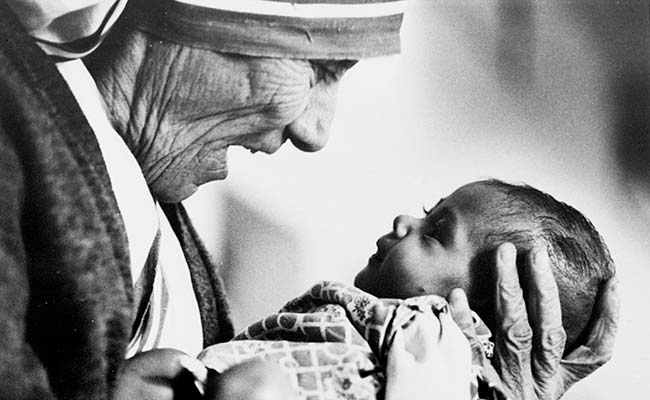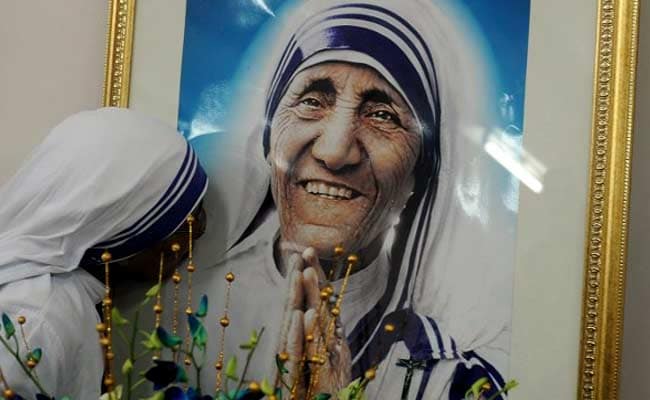As I write this, it is breakfast time in Rome. The formal canonisation of Mother Teresa, for which we are all here, is on Sunday. This is a day of waiting, of patience and reflection. On the journey from Kolkata, a flood of memories and experiences overwhelmed me. Mother died in 1997, but in many respects, things she said or did, little phrases or actions that seemed quizzical and strange at that time, have come to acquire a new meaning.
I wasn't drawn to Mother because of my Christian faith. Growing up in a household where going to church was as important as being part of the neighbourhood Durga Puja committee - or visiting one of my father's closest friends, a Muslim, for Eid - I took God seriously l, but not religious identities. Like others in Kolkata (then Calcutta) - and the world - I had admired Mother's work and the selfless service of her order of nuns, little women in their blue and white saris, literally picking up the poor, the starving and the near dead from the footpaths.
Once I got to know her better, particularly after a deeply meaningful book project about which I have written earlier, I began to see Mother Teresa as not just a saintly and compassionate person but as the remarkable institutional builder she was. I began to understand, as much as it is possible to understand greatness, her methods. In fact, I wrote a chapter on her in a book on tips from the lives of successful achievers. She was the only religious figure I used, not because there have not been others, but because her work was the one I had observed most closely.

Mother Teresa was acclaimed for her work for the poorest of the poor in the slums of Kolkata (File photo)
Mother left nothing to chance. She was meticulous and focused, she planned every move and she exploited every relationship - not for personal gain but in the service of the poor, the ill and the forsaken. "Leadership Skills of Mother Teresa" and "Management Techniques of Mother Teresa": these are books waiting to be written. Looking back at my many interactions with her, I remain struck by Mother Teresa's astuteness and negotiating skills. In her quiet, understated and unassuming way, she taught me a lot about how to run a business, how to reach goals and achieve success. Consider the evidence.
One, when she asked the rich and famous for help, whether it was heads of government or high-rolling restaurant owners who were requested to give leftover food (cooked for the day but not served to customers) to the local home of the Missionaries of Charity for feeding the poor, Mother not just came straight to the point, but commanded more than pleaded. She knew the audience was a bit awe-struck by her presence. This did not make her arrogant or proud. She simply portrayed a confident person who knew her brand value. She began the process of negotiation by putting the other person on the defensive in the sweetest manner imaginable.

Mother Teresa was awarded the Nobel Peace Prize in 1979 for her work for the world's destitute (File photo)
That experiential learning was all Mother would offer. If you wanted to know about her life, you would have to labour for it and find out for yourself. She had no time to spoon-feed. And yet there were others, those who needed genuine succour and had been brought home from the streets, whom she would happily and lovingly spoon-feed.
Three, in her cultivated nonchalance and then sudden, even forceful entreaties for help for her Mission's charitable work, again she was taking those she was visiting or meeting or interacting with by surprise. This was and remains a key weapon in any transaction. In Mother's case, it often reminded me of the story of the Mahatma selling his autograph, even to a little boy who the Mahatma insisted needed to get four annas from his father. This was not because the Mahatma was greedy. It was because he knew his fame served little purpose unless he used it to raise resources for his ashram and noble work of social uplift and nation building.
Mother Teresa was similar in pushing the envelope. What's more, she knew would succeed. She knew it even before she started. She did all this not for personal profit but to pay dividends to the wider stakeholders of her enterprise, her multinational corporation of compassion - the poor and the forsaken, the indigent and the destitute. In honouring her, the Catholic Church and the international community are honouring themselves.
Derek O'Brien is leader, parliamentary party Trinamool Congress (RS), and Chief National spokesperson of the party.
Disclaimer: The opinions expressed within this article are the personal opinions of the author. The facts and opinions appearing in the article do not reflect the views of NDTV and NDTV does not assume any responsibility or liability for the same.


